Feng shui plants are becoming increasingly popular in people’s lives. Houseplants not only bring green spaces, oxygen, and beauty to the landscape, but they also attract wealth, prosperity, and good fortune.
However, many people wonder if there is any difference in Feng Shui meaning between bonsai plants and regular potted plants. And which ones are better to cultivate?
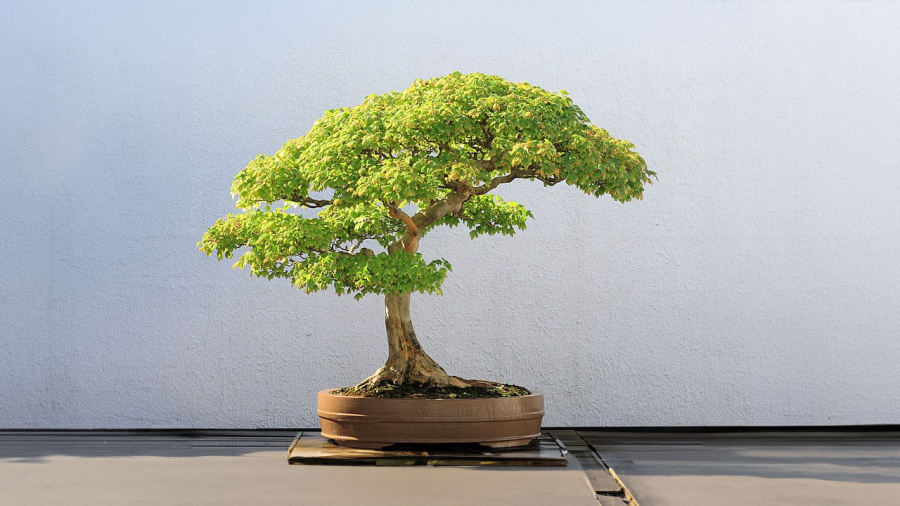
What is a bonsai tree?
A bonsai tree is a form of a houseplant that is shaped into various styles by the gardener, using bending and shaping techniques. On the other hand, growing a natural plant involves simply planting and pruning the branches when necessary.
Bonsai trees originated from China before spreading to Japan, where they were transformed by meticulous Japanese artists into an art form in horticulture. In bonsai form, plants not only carry the meaning of the species but also the significance lies in the shape and style of the bonsai. Bonsai trees come in various sizes, with the most common being small-sized plants with mature age, strong and robust trunks, and lush green leaves. Bonsai trees are shaped into beautiful styles that bring good feng shui, luck, and prosperity.
Bonsai trees are usually vigorous and require less soil in the pot. The beauty of bonsai lies not only in the type and species of the plant but also in the art of shaping and styling by the gardener.
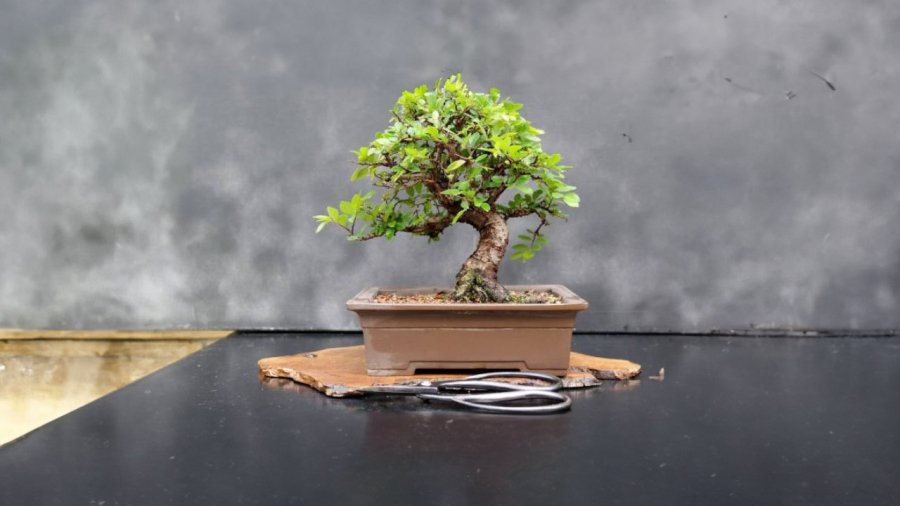
The deep meaning of bonsai lies in the image created by the player. Bonsai represents perseverance, resilience, and artistry in life. Bonsai trees are mostly ancient trees, symbolizing longevity, a desire of humans. In addition, the tree also symbolizes Emperor, General, Parent, and Child; Three pillars – Five elements – Four virtues. In which, Emperor represents the main trunk of the tree and large branches symbolize the main branches of the tree, Parent represents the small branches, and Child represents the leaves of the tree. Three pillars mean three levels of bonsai, five elements are the five branches of the tree, and Four virtues are four sections of the tree.
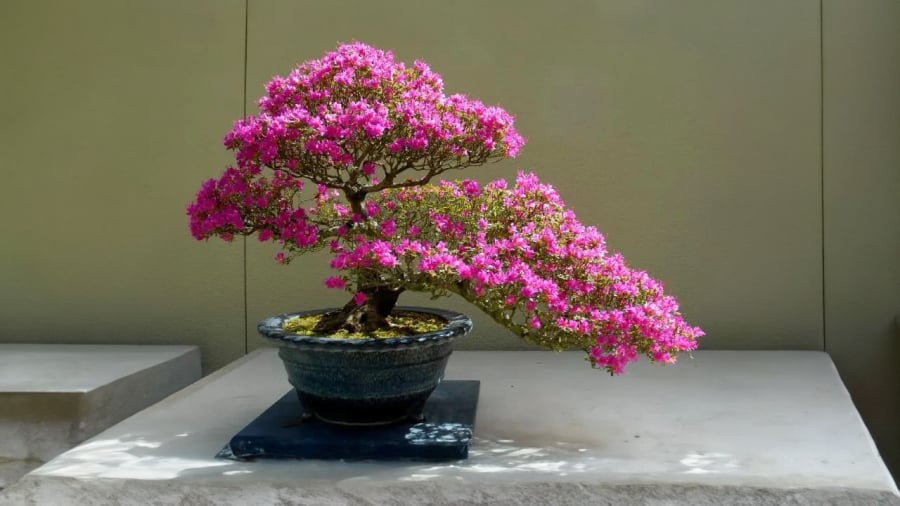
Which should you choose: bonsai or potted plants?
From a feng shui perspective, when choosing between a potted plant and a bonsai tree, both have the original feng shui meaning of the species. For example, a lucky tree symbolizes wealth and prosperity. However, when shaping a bonsai tree, it adds the feng shui meaning of the tree’s shape to it. Therefore, if considering luck and fortune, both cultivation methods bring a certain meaning to the homeowner. However, bonsai trees have a higher artistic meaning.
In addition, the choice between potted plants and bonsai trees also depends on personal preferences. Many types of plants may not look beautiful when potted, but they become stunning when shaped into bonsai trees. For example, a ficus tree may not look beautiful in a pot, but when shaped as a bonsai tree, it becomes beautiful. And for larger feng shui plants such as sung (Ficus microcarpa), si (ficus benjamina), and da (ficus religiosa), they may look unattractive when potted indoors or become too big for the pot, so choosing bonsai trees would be a better option.
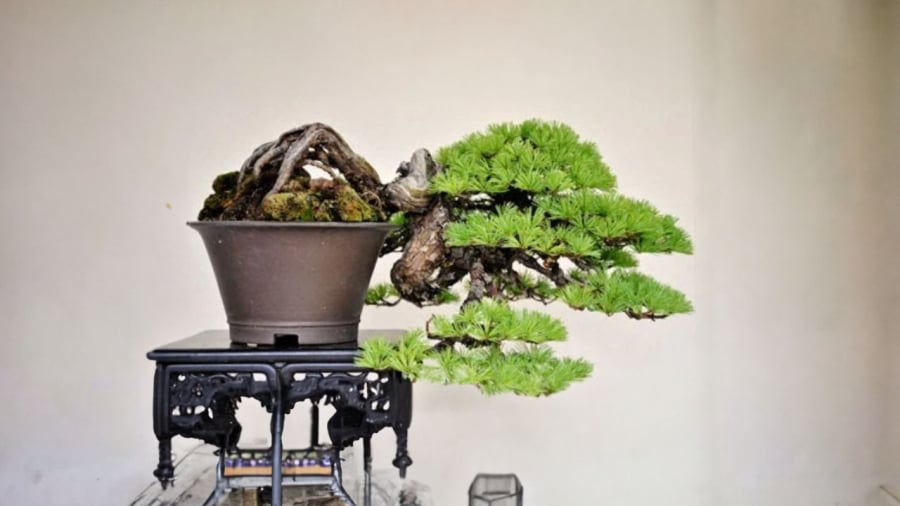
However, when choosing bonsai trees, besides considering the type of plant, you also need to have time and the technical skill to shape the bonsai tree.
Therefore, whether to choose bonsai or potted plants depends on your personal preference, whether you have the time and skill to create bonsai trees or not. Growing bonsai trees requires more time and meticulous care. However, if the purpose is to attract wealth and prosperity, it is not necessary that bonsai trees are better.
Various Bonsai Styles and Their Feng Shui Meanings
Regardless of the type of plant or tree, bonsai trees have various styles, and each style represents different meanings as follows:
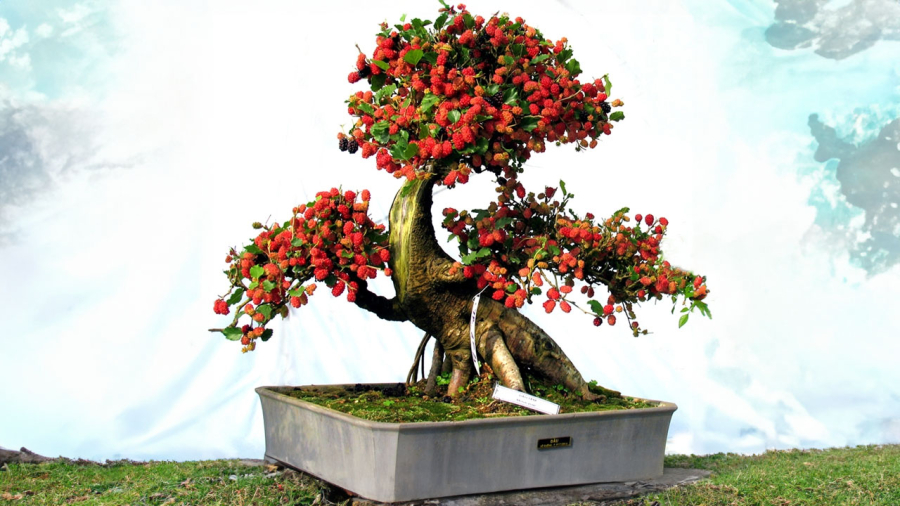
Triple trunk style: This style represents three trunks growing from a single root or three trees grafted together, symbolizing Fortune – Prosperity – Longevity. Triple trunk bonsai is very popular among bonsai enthusiasts. This style of bonsai represents a prosperous and long-lived family.
Cascade style: The cascade bonsai is bent to resemble a waterfall. This style is usually low, with branches extending from the trunk down to the pot, resembling a flowing waterfall. This style symbolizes the source of water, the source of life’s nourishment. The cascade style represents fearlessly advancing forward in the face of strong winds and challenges.
Five blessings style: This style consists of 5 trunks in one pot, representing the Five Elements: Metal, Wood, Water, Fire, and Earth – the five essential elements in the formation and development of all things. This bonsai has 5 well-developed branches, lush leaves, and strong roots. Alternatively, one main trunk and 4 side branches or one tree with 5 branching levels are called the five-blessings bonsai. Five-blessings bonsai combines the five elements of growth and development in all things and signifies Fortune, Prosperity, Longevity, Peace, and Health for the homeowner.
Seven scholars style: This style takes inspiration from the lives of seven scholars who live carefree, optimistic lives. This style shows one main stem with 7 branches growing gradually from the roots to the top. The seven scholars’ bonsai represents the joy of enjoying life, always being carefree and optimistic in the face of life’s ups and downs, and paying little attention to wealth and fame, which is the meaning of this bonsai style.
Great hero style: This bonsai style represents a chivalrous person, a hero with a broad vision or someone who helps others. The great hero bonsai symbolizes firmness, strength, goodness, and heroism.
Twin trunk style: This bonsai has two trees wrapped around each other, one tall and one short, closely hugged and with the branches forming a circle around the trunk. Twin trunk bonsai symbolizes the love and support between couples.
Dragon and phoenix style: This classic bonsai style requires meticulous skill and effort, from selecting the tree to shaping and styling it. Therefore, this bonsai style always captivates bonsai enthusiasts when being displayed. The dragon and phoenix bonsai represents tremendous strength and symbolizes power, high social status, and position.
Fairy style: This bonsai style is delicate like a fairy. The tree trunk is flexible, with graceful curves resembling those of fairies. Fairy bonsai represents elegance and exquisite beauty.
Grand forest style: This bonsai consists of multiple small-standing trunk trees planted in a small area, simulating a natural forest closely resembling a real one. Grand forest bonsai symbolizes longevity, with tall and short trees intermingling, representing family reunion and abundance.
Bat-shaped style: This bonsai style features a tree leaning like a crescent moon, showing courage and resilience, standing up against strong winds, inclined to embrace storms. Bat-shaped bonsai symbolizes strength and resilience despite the challenges and obstacles in life.
Choosing the right bonsai pot
When planting bonsai, it is important to choose the right pot that matches the tree. If the tree and the pot do not match, such as planting a small tree in a big pot or having an uneven height between the pot and the tree’s shape, the artistic charm that the tree originally had will be lost. Here are some suggestions for choosing pots that match the bonsai style:
Tall-shaped pots: Tall pots with pedestals resemble tall trees growing on mountain tops, representing strength and stability. This type of pot is suitable for cascade-style bonsai trees (hanging style).
Rectangular pots: Rectangular pots are suitable for trees with strong and healthy shapes, or trees with wide canopies, including upright-grown trees such as pines, cypresses…
Square pots: For bonsai trees with a straight upward growth pattern, such as pines or cypresses, choosing square-shaped pots is appropriate.
Round pots: If the plant has clustered roots and is not too big, choosing a round pot with a rounded bottom will enhance the aesthetic appearance. The pot size should match the tree size.
Ceramic or fired clay pots: These pots are cost-effective, but their load-bearing capacity and durability are not high. It is not recommended to plant trees with large, tall roots as they may break or crack the pot.
Bonsai is a meticulous and ancient art of playing with plants. You can choose simple bonsai pots that have been already shaped by artists and focus on pruning leaves and branches when necessary and learn how to care for the plants. With limited space but an aspiration to have large plants such as sung, si, sanh, or loc vung, bonsai trees can be the perfect fit.
However, choosing bonsai means allocating more time and meticulous care than choosing regular potted plants. As for the feng shui meaning of each type of plant, it does not diminish whether you choose bonsai or potted plants.
This information is for reference and contemplation purposes.





































